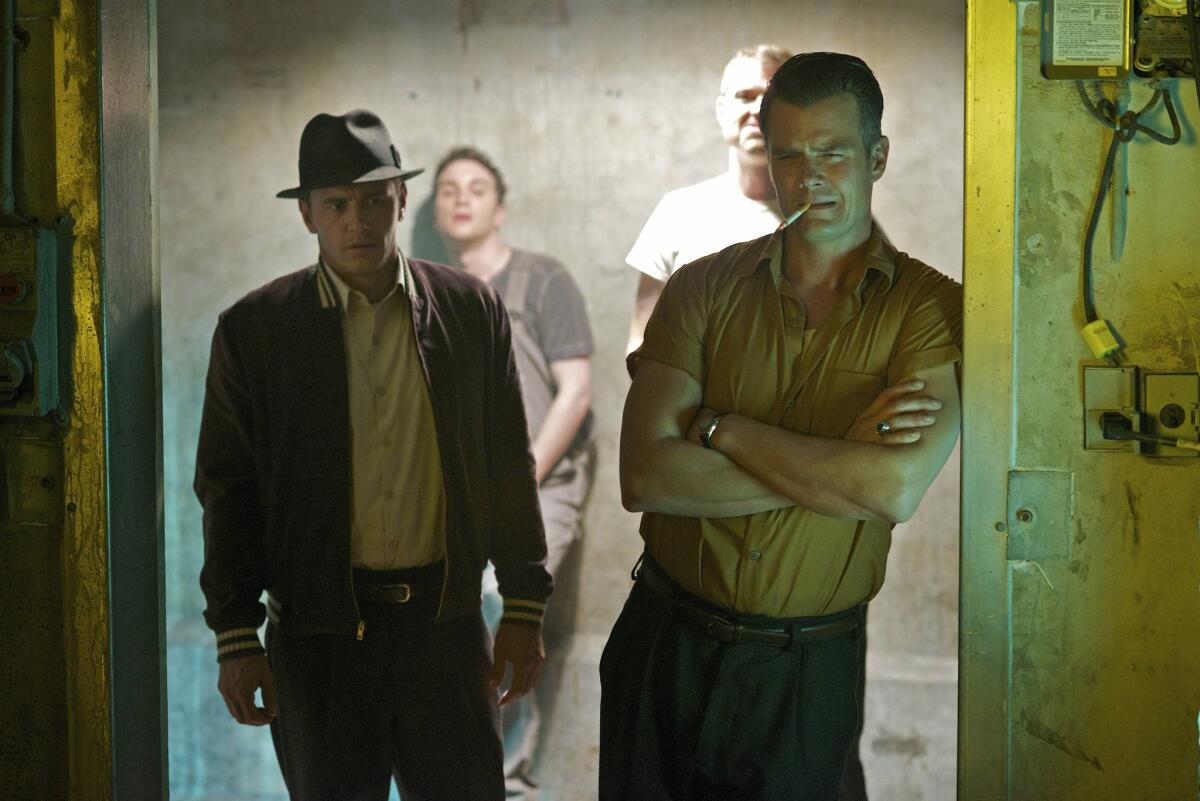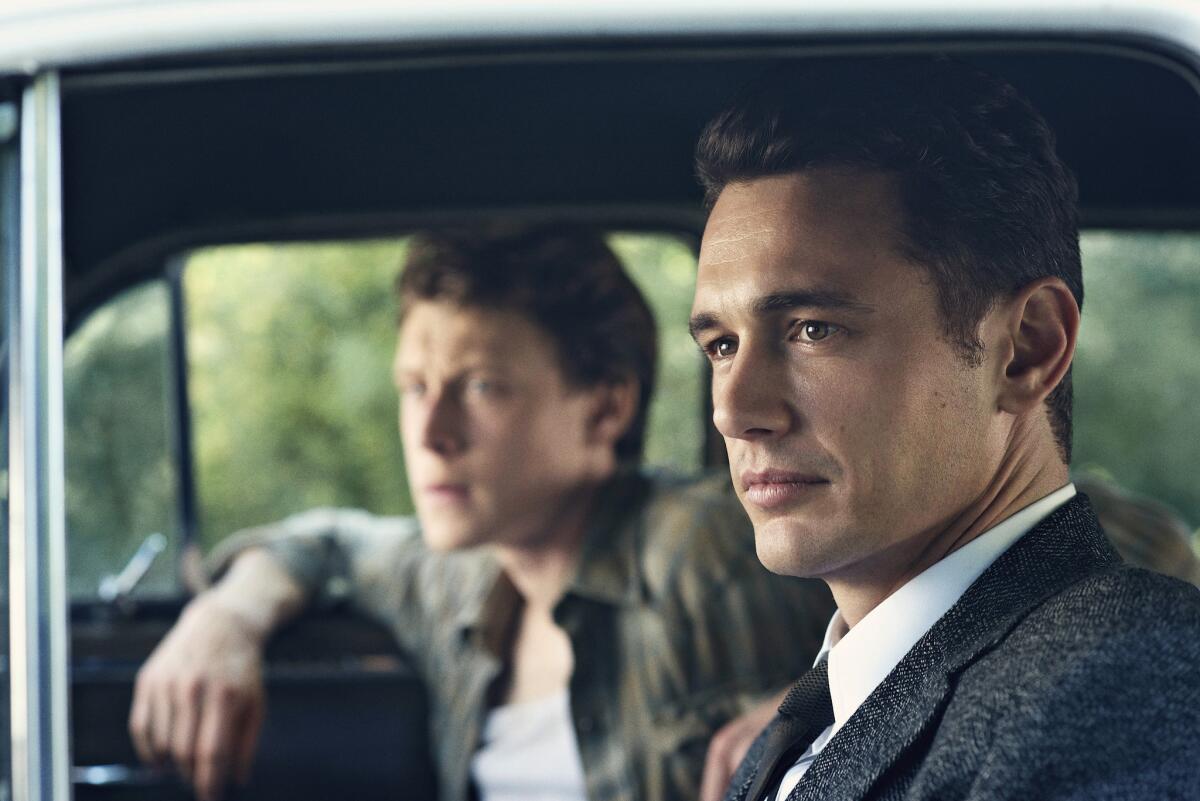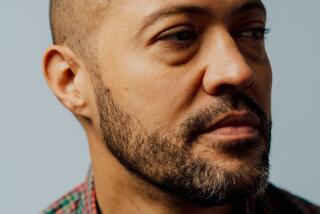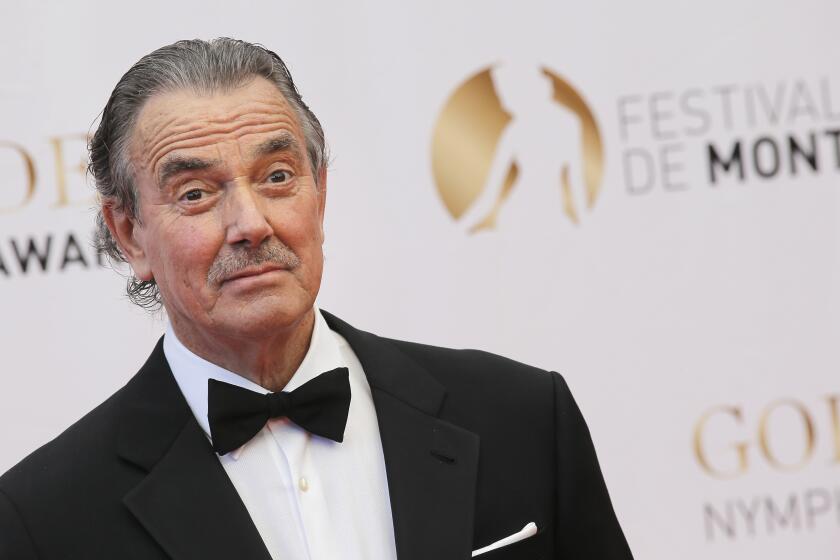Q&A: ‘11.22.63’ showrunner Bridget Carpenter on adapting a Stephen King novel
Hulu’s “11.22.63,” the sci-fi miniseries that premiered Monday, has a lot of flashy manpower behind it: Stephen King wrote the time travel novel on which it’s based, J.J. Abrams is an executive producer, and James Franco headlines the series.
But the one wrangling it all together is “Friday Night Lights” and “Parenthood” veteran Bridget Carpenter, who serves as the showrunner of the limited series.
See more of Entertainment’s top stories on Facebook >>
The Times spoke to Carpenter about adapting King’s novel -- about a teacher (Franco) who travels back to 1960 on a mission to prevent JFK’s assassination -- for the streaming screen, and what it might entail to distill Franco’s life into a miniseries.
Time travel is a very tricky thing -- there are rules and consequences to account for on every level
We got very lucky with this one because, yes, there are rules to it, but they’re very simple. There are only two, really. Stephen King dealt with it so elegantly, we didn’t get bogged down with “this, if this” and “this, if this.”
We did not examine every fundamental paradox, which is inherent in the nature of an impossible thing. We just went, this is the rabbit hole, here’s how it works, he goes in it, the end. And that, to me, went, well, that’s how we’re going to shoot it. There’s not going to be special effects, there’s not going to be sparkly dust. You’re in and then you’re in. That, as a fundamental thing, drove us. We tried to use it, as King did, as a leaping-off point that triggers the story.
And then the story is the story. Time travel ceases to become the story. It is inherent in Jake and who Jake is as he moves through the world, but we don’t need to worry about it as the logistics of travel. It’s important in the beginning and it’s important in the end. And then in the middle, you’re good. There’s nothing to keep track of—you’re fine.

This image released by Hulu shows James Franco as Jake Epping, left, and Josh Duhamel as Frank Dunning in a scene from the eight-part series, “11.22.63,” streaming on Hulu beginning Monday, Feb. 15, 2016.
The book was previously optioned by Jonathan Demme, the director of “The Silence of the Lambs,” but he and King couldn’t agree on which parts of the narrative to keep or not. What was your approach?
I never knew about what Demme did. He might have been trying to make it a movie. I think the fact that I got to make it a series was a big deal, and I had a lot of freedom given to me by Bad Robot and Warner Bros and Hulu. They all said, take as much time as you need. However long it needs to be—it can be 12 hours, it can be whatever you want. And, so, at first, I was like, OK, it’s going to be this and it’s going to move really fast and it’s going to be four hours. And then I went away for a while and came back and was like, I think it’s going to be six hours. Then I went away again and I was like, I know it’s nine. That’s where we’ll stop—it’s nine. I actually was willing to do some heavy chopping to start with and then the more I dug into it, the more I thought I wanted to give everything its due but I always want to keep a pace.
What went into the process of picking and choosing what to keep? How central is going off what you think readers will remember versus going off what you think non-readers will need to carry them along? Any parts you wanted to cut that others fought you on?
I read the book enough times to begin working from memory. I used my memory of the book’s events to create a loose structure to hang each episode on.At that point, shaping the story’s architecture becomes a little like cooking: You add a little bit here, subtract a little bit there. I admit that for a short time at the start, I was advocating to cut Jake’s janitor friend, Harry Dunning -- I was worried that viewers would be saying “get to 1963!” But my co-executive producer Kathy Lingg questioned that idea so strongly, so passionately, I thought, OK, I’ll go back to the book and figure out how to keep him. Which I’m very glad that I did, because the episode that focuses on Harry’s backstory is one of my favorites.
What talks or guidance did you get from Stephen along the way? Were there key elements he was keen on making sure you got right -- the look of it, the feel of it?
Stephen King was incredible - and not only because his books have influenced my whole life. He has enough confidence in his own work to be very open to changes that would serve the story dramatically. The thing that he wrote to me that influenced me the most was this: “when I wrote this book I was thinking two things -- the ‘60s were great. And the ‘60s sucked.” His attitude -- that contradiction was fundamental to the experience of that time -- freed me.
There’s obviously a re-creation of the JFK assassination -- a scene we’ve seen numerous times in other projects. Talk about the level of detail and research that went into that and the challenge of making it still feel powerful and/or making it resonate for a generation that is so far removed from it.
Our desire was to film the most detailed, the most precise version of the motorcade on Nov. 22, 1963, that has ever been shot. Our brilliant production designer, Carol Spier, is a research maniac. She and her art department knew the signage, knew the architecture, knew the street signs. And our costume designer, Roland Sanchez, had studied the Zapruder film and blown up the frames so he could replicate the outfits and fabrics that those citizens were wearing that day. Of course, those same film frame reference photos went to Background Casting, since we had to find people who closely resembled those real people. Our Co-EP, Brian Nelson, was walking among the extras on the day we shot, and he stopped short when he saw the Babushka Lady. “Do you know who you are?” he asked her. Of course she did. She gave him a long answer. This was a background actor who really knew her backstory!
We had five cameras shooting at once. One from the roof of the Texas School Book Depository. And a 16-mm camera exactly like the one Zapruder used, held by a camera op standing in the exact place that he stood.
The day we filmed in Dealey Plaza, there was genuine excitement in the air. People were thrilled. Something about the re-creation -- the fact that this drive, these buildings, have not changed at all -- touched everyone. People were really bubbling every time the motorcade came around, every time the actor playing the president waved in their direction. It felt like a real parade. It didn’t feel like people were acting.

This image released by Hulu shows James Franco as Jake Epping, right, and George MacKay as Bill Turcotte in a scene from the eight-part series, “11.22.63,” streaming on Hulu beginning Monday, Feb. 15, 2016.
It might be hard to remember way back, but what scene from the first episode would you say was the most challenging to pull off?
The scene that was hardest to pull off was probably the sequence in the El Conejo. You’re dramatically setting up the rules of this world -- what it means to see the past pushing back -- and you’re simultaneously establishing that Al went through this too, because Jake is recalling Al telling him about his own experience. This was hard to write succinctly (as a producer, I also know as I’m writing what this is going to cost! [hint: a lot]) and also hard to pace.
How many episodes of hours would you need to do an event series of James Franco?
It would be a reality show. That’s what I would need. I need a lot of bandwidth. I need a crew who was willing to travel. There’s no cutting. It’s a one-take situation. I know a steady cam operator who could do it. Just travel with him around. It’s an open-ended run. I wouldn’t put an end on that. I know that he is always doing something.
Did you have preconceived notions of what this was going to be like?
Yes, and I was very afraid. I was always afraid that he’d be going away. I’d be like, what do you mean you’re going away this weekend? Go home and rest for the show. He’d be like, “Bridget, it’s going to be fine.” I’d be like, “No, no, no, don’t go do a commercial or whatever the 500 million things that you’re doing.” I’d hear, he’s going here, he’s going to New York, he’s writing a musical. It was like, really? But, you know what, that guy always shows up on time and he brought it. It’s funny that it’s a joke, but the joke is also true. He can do a zillion things. It was funny, we were talking about the publicity schedule for the show and he was like, “I don’t know, I’m teaching four classes.” And I was like, “James.”
I’m sure you were pulled in just as many directions with this show. How would you describe your way of doing things? Are you a procrastinator like we often hear from writers?
No. I have two children. There’s no room for procrastination. I have a 4-year-old and an 8-year-old. I write and I go home. There’s no procrastination. It’s like, get ‘er done. My agent likes to say, ‘You want something done in Hollywood, ask a working mom.’
What advice would you give females trying to be seen and heard in this industry?
Be fearless. Understand what you bring to the table, be clear about what you bring to the table. If there is a generalization to be made, the generalization I’ve seen is women tend to be sharers of credit and I think you have to be willing to blow your own horn when appropriate because there are a lot of guys out there who have no problem taking that credit.
We have to do it. It’s a bummer that it’s incumbent upon you, but it is incumbent upon you both for yourself and everyone who is following you to fight for the recognition. We have to do it. The phrase of the hour that cannot be truer is “unconscious bias.” It’s not necessarily a world of misogyny that we live in. But we do live in a world where unconscious bias is real and you have to take a deep breath and step up to the table and go, I’m here to play. I’m here to work. Acknowledge me.
There was a study recently that said something like female show runners are more likely to hire more females or more minorities.
I can always get better. I do think about that. And I have to push myself. I love the directors that worked on this show. But they’re all men. I have three female directors but, for various reasons, they fell out and this is how it worked out. I thought to myself, I want a deeper list. I don’t think a lot of people are trying to keep people out. I think people go to their comfort zone. And that comfort zone is often who they know. It has to be an active conversation always.
I tweet about TV (and other things) here: @villarrealy
More to Read
The complete guide to home viewing
Get Screen Gab for everything about the TV shows and streaming movies everyone’s talking about.
You may occasionally receive promotional content from the Los Angeles Times.







